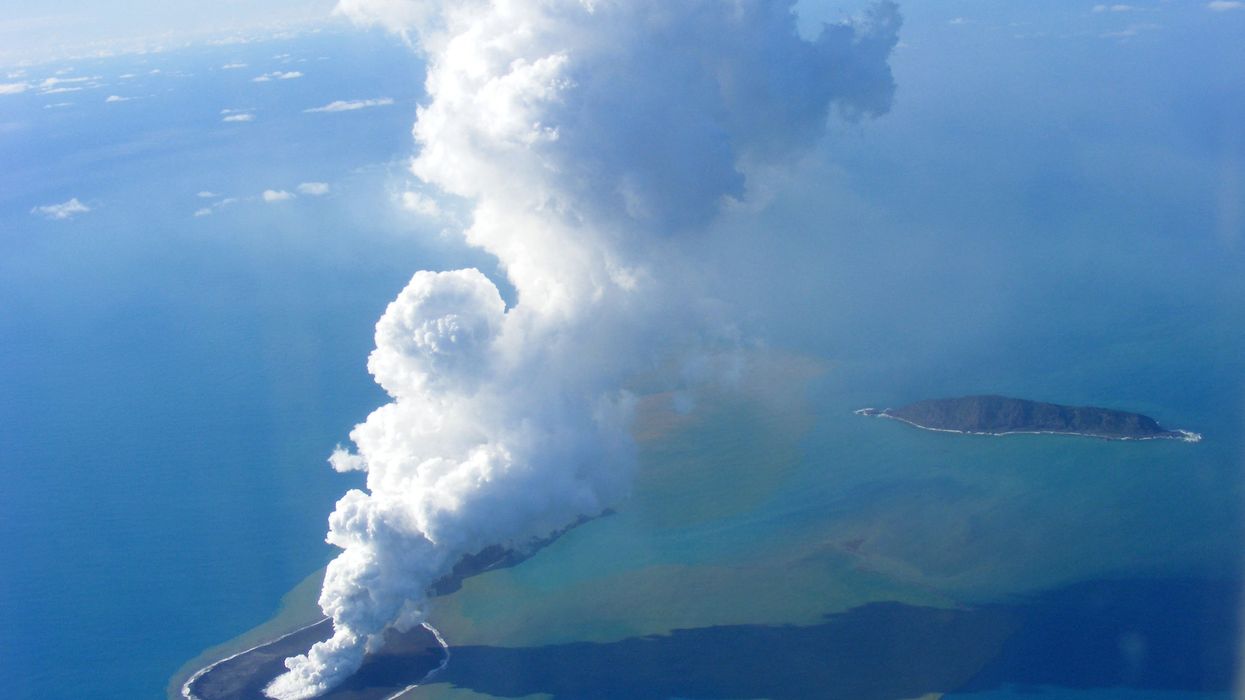Science & Tech
Alex Daniel
Aug 29, 2023

The Hunga Tonga-Hunga Ha’apai eruption in January 2022
TELUSA FOTU/Matangi Tonga/AFP via Getty Images
As global temperatures continue to soar, some commentators have pointed to a massive volcanic eruption in 2022 as the reason.
Disclaimer – it's not that.
The Hunga Tonga-Hunga Ha’apai eruption in January last year was among the biggest volcanic eruptions ever recorded, with the force of 100 Hiroshima bombs.
The reason you may not have heard about it at the time is that it happened underwater. Nonetheless, the blast sent millions of tonnes of water vapour high into the atmosphere.
Now, as the effects of climate change grow more and more apparent, some people have used it to cast doubt on humans’ role in global heating. Others have tied it in with El Niño, the cyclical ocean warming event that happens every two to seven years in the Pacific.
So is the eruption actually the reason for the super-hot summer we’ve seen in some parts of the world?
“The short answer is no,” said Gloria Manney, a senior research scientist at NorthWest Research Associates and New Mexico Institute of Mining and Technology, and Luis Millán, a research scientist at NASA's Jet Propulsion Laboratory, in an interview with Live Science.
“Even though El Niño has made the global temperature higher and the Hunga Tonga-Hunga Ha'apai eruption might have affected some regions for a short time, the main culprit is climate change,” they said.
Instead, many studies show that human activities like burning of fossil fuels are the driving factor behind the climate crisis.
Massive volcanic eruptions tend to reduce temperatures because they spit out huge amounts of sulphur dioxide, which form sulphate aerosols that can reflect sunlight back into space and cool the surface temporarily, the researchers said. But the Tonga eruption had another effect because it occurred underwater.
“The Hunga Tonga-Hunga Ha’apai eruption is peculiar because, in addition to causing the largest increase in stratospheric aerosol in decades, it also injected vast amounts of water vapour into the stratosphere,” Manney and Millán said.
Water vapour absorbs solar radiation and traps heat in the atmosphere. Several studies have proposed that, because of how much water vapour the eruption generated, it could have had a temporary warming effect.
A study published in the journal Nature Climate Change in January estimated that the eruption made the water vapour content of the stratosphere increase by 10 per cent to 15 per cent — the biggest increase ever documented.
In turn, researchers calculated that the water vapour could increase the average global temperature by up to 0.035 degrees Celsius, Eos magazine reported in March.
Because of this, some commentators have linked global warming to this. But researchers involved in the studies have been clear that the volcano is not a big factor in our changing weather.
“It’s probably fair to say that the influence of [the volcano] on this year's extremes is quite small,” Stuart Jenkins, a climate scientist and postdoctoral researcher at Oxford University in the UK and lead author of the January study, told The Hill.
Global warming long predates the eruption, with the five hottest Julys on record all coming in the last five years, according to NASA.
“Last July’s record-breaking global temperatures are just a preview of what may happen if we do not take more bold and ambitious climate action,” Manney and Millán said.
Sign up to our new Indy100 weekly newsletter
Have your say in our news democracy. Click the upvote icon at the top of the page to help raise this article through the indy100 rankings.
Top 100
The Conversation (0)













